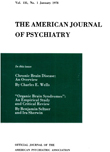CEREBRAL ATROPHY IN PSYCHIATRIC PATIENTS
Abstract
1. The early clinical symptoms of 40 patients with cerebral atrophy subsequently demonstrated by pneumoencephalogram are reviewed. In 25 cases the earliest abnormalities noted were not memory loss or impairment, but paranoid ideas, depression, neurosis, or psychopathy.
2. Clinical data of the patients with cerebral atrophy were compared with those of a control group who were suspected of having cerebral atrophy, but had normal pneumoencephalograms. The diagnosis of cerebral atrophy is found to be positively correlated with 3 factors: (a) presence of memory impairment by history or examination, (b) presence of abnormal findings on neurological examination, and (c) age over 40.
With the absence of any 1of these factors the probability of demonstrating cerebral atrophy radiologically is considerably diminished and with the absence of any 2 the probability becomes extremely small.
3. Cerebral atrophy was found in 5 patients with depression, of the 40-60 age group, without evidence of memory impairment or abnormalities in the neurological examination.
Access content
To read the fulltext, please use one of the options below to sign in or purchase access.- Personal login
- Institutional Login
- Sign in via OpenAthens
- Register for access
-
Please login/register if you wish to pair your device and check access availability.
Not a subscriber?
PsychiatryOnline subscription options offer access to the DSM-5 library, books, journals, CME, and patient resources. This all-in-one virtual library provides psychiatrists and mental health professionals with key resources for diagnosis, treatment, research, and professional development.
Need more help? PsychiatryOnline Customer Service may be reached by emailing [email protected] or by calling 800-368-5777 (in the U.S.) or 703-907-7322 (outside the U.S.).



